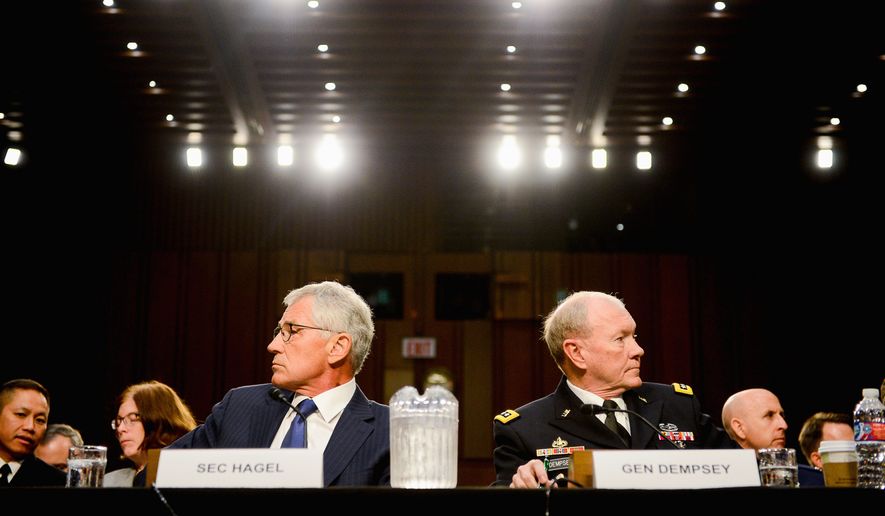The Pentagon’s top general opened the door Tuesday to the possibility that U.S. combat troops would be needed in Iraq, as he publicly laid out President Obama’s still-developing plans to combat Islamic State insurgents through U.S. air power and relying on an as-yet-unformed coalition of Muslim and Arab allies.
Gen. Martin E. Dempsey, chairman of the Joint Chiefs of Staff, said if it were to appear that Iraqi troops and Kurdish forces had a chance to reverse some of the Islamic State’s gains, such as retaking Mosul, U.S. troops might be needed.
The warning came as Congress prepares to vote this week on approving training and supplies for moderate rebel forces in Syria, whom the U.S. hopes will turn that firepower on the Islamic State, an insurgent group also known by the acronyms ISIS or ISIL that has captured large chunks of Syria and Iraq.
Lawmakers seemed inclined to support that request, but those on both sides of the aisle were deeply skeptical of the rest of Mr. Obama’s plans, saying he is depending too heavily on Iraqi forces that have already proved incapable of fighting, and he will need buy-in from an international coalition that has yet to emerge.
“The president’s strategy to defeat ISIS is fundamentally detached from the reality on the ground,” said Sen. James M. Inhofe of Oklahoma, the ranking Republican on the Senate Armed Services Committee. He said Mr. Obama is treating the Islamic State like al Qaeda terrorists in Somalia or Yemen rather than like an invading army 30,000 strong armed with tanks and artillery.
Mr. Obama’s plans rely on a coalition of Middle East nations agreeing to provide money, arms, training and, in some cases, potentially their own special forces troops to combat the Islamic State.
SEE ALSO: Indonesia cracks down on suspected jihadists as Islamic State fears mount
The president has outlined a limited role of support for the U.S., including providing arms and training for another 5,000 rebel fighters this year in Syria, continuing a campaign of airstrikes that began in August and stationing troops at command centers in Iraq to help Iraqi forces coordinate their attacks.
Mr. Hagel said the administration envisions 1,600 American troops on the ground in Iraq.
Those troops are not supposed to be engaged in combat roles, but Gen. Dempsey seemed to open the door to an expansion of their mission, saying he would go to Mr. Obama and ask for combat troops if he thought it would help the U.S. achieve its goal of reversing the Islamic State’s gains.
“An example: If the Iraqi security forces and the [Kurdish peshmerga] were at some point ready to retake Mosul — a mission that I would find to be extraordinarily complex — it could very well be part of that particular mission to provide close combat advising or accompanying for that mission,” Gen. Dempsey said. “But for the day-to-day activities that I anticipate will evolve over time, I don’t see it to be necessary right now.”
The general did acknowledge that the pilots and aviators conducting the airstrikes right now are engaged in combat, and said if some of them were shot down over Islamic State territory, the U.S. would mount rescue missions that could use combat troops.
Gen. Dempsey’s comments sent the rest of the administration scrambling, with Mr. Obama’s spokesman assuring reporters traveling with Mr. Obama aboard Air Force One that nothing has changed in the president’s thinking.
PHOTOS: Top 10 U.S. fighter jets
“What he’s been very specific and precise about is that he will not deploy ground troops in a combat role into Iraq or Syria,” press secretary Josh Earnest said.
Gen. Dempsey’s own spokesman, Col. Ed Thomas, issued a statement saying the general was envisioning ways to help call in airstrikes, not to be part of ground combat units marching alongside Iraqi troops.
Talk of combat troops being returned to Iraq is controversial given the near-decadelong war the U.S. fought there, first to depose former leader Saddam Hussein and then to defeat insurgents intent on destabilizing the country.
Some members of Congress, particularly on the Republican side, questioned whether the U.S. could achieve the mission without a more robust American force engaged in the fight.
Several Republicans questioned how training 5,000 rebels in one year could help when the Islamic State’s force is already estimated at more than 30,000, with two-thirds of them in Syria.
Gen. Dempsey said that’s why the U.S. will have to hope for military assistance from Turkey, Jordan and Syrian Kurds.
Some Democrats, meanwhile, wondered whether it’s possible to vet Syrian rebels properly, and said it’s likely the arms the U.S. provides will eventually be used against American interests.
Other Democrats questioned Mr. Obama’s about-face on the authority he’s claiming to use to engage in war without coming back to Congress for permission.
Sen. Tim Kaine, Virginia Democrat, said Mr. Obama himself had called for an end to the 2001 and 2002 authorizations to use force to go after al Qaeda and to oust Saddam Hussein, yet now the president cites both of those as justification for his war plans.
“I think the mission as described is reasonable. But I think Congress is necessary,” Mr. Kaine said. “If we’re not willing to do our job as Congress [to] bless the mission and say that it’s worth it, we shouldn’t be asking people to risk everything.”
• Stephen Dinan can be reached at sdinan@washingtontimes.com.




Please read our comment policy before commenting.